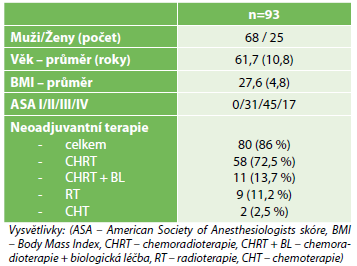Abstrakt
Úvod: Transanální totální mezorektální excize (TaTME) je relativně novým přístupem v operační léčbě karcinomu rekta. Nejsou zatím jasně známé indikace, pro které tuto strategii zvolit. Pro chirurga se jedná o technicky náročný výkon s dlouhodobou learning curve, což mimo jiné přispívá k problematice hodnocení této metody. Při zkoumání přínosu TaTME je nutné sledovat onkologické výsledky i pooperační komplikace. Cílem této práce je posouzení potenciálního benefitu TaTME u tumorů středního a distálního rekta.
Metody: Retrospektivní zhodnocení souboru pacientů operovaných od října 2014 do června 2019 jedním týmem chirurgů. Analyzovány byly demografické ukazatele souboru pacientů, staging nádoru před zahájením léčby, výsledky definitivního zhodnocení resekátu patologem, výskyt časných pooperačních komplikací a možnost zrušení stomie.
Výsledky: Hodnoceno bylo 93 pacientů po provedení TaTME s anastomózou pro nádorové postižení střední a distální třetiny rekta. Průměrné BMI bylo 27,6 (4,8). Vstupně mělo tumor T3 nebo T4 73 (78,5 %) pacientů, 68 (73,1 %) pacientů mělo pozitivní lymfatické uzliny a 12 (12,9 %) pacientů bylo léčeno pro synchronně metastazující karcinom rekta. Neoadjuvantní onkologickou léčbu podstoupilo 80 (86 %) pacientů. Konverze na výkon otevřený byla nutná v jednom případě (1 %). Staplerová anastomóza byla provedena ve 37 (39,7 %) případech, ručně šitá byla v 56 (60,2 %). Pozitivní cirkumferenční resekční okraj (CRM) byl nalezen v 10 (10,7 %) případech. Distální resekční okraj (DRM) byl pozitivní ve 3 (3,2 %) případech. Patologická analýza kvality TME prokázala...

